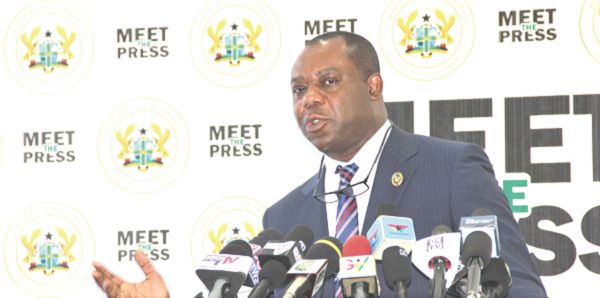
Non-PhD holders cannot lecture in university — Education Minister
The Minister of Education, Dr Matthew Opoku Prempeh, has announced that from now, only PhD holders will be allowed to lecture in universities.
"Now if you do not hold a PhD, you will not be able to teach in a university, but most of the lecturers in our colleges of education do not hold PhD so we are giving them time to improve their knowledge, through a British government support," he added.
Speaking at the meet-the-press series in Accra on Tuesday, he explained further that the ultimate goal of the action was to ensure that the universities developed the capacities of teachers in the colleges of education.
He said he was hopeful that if the lecturers of the colleges of education were part of the university, the university would help those lecturers to get onto the PhD programmes.
Improving teachers’ capacity
Dr Prempeh explained that every capacity improvement was to improve the learning outcomes for the benefit of the Ghanaian schoolchild.
He cited for instance that in Finland it was PhD holders who thought at the Kindergarten level, while in Ghana it was diploma holders, describing it as unacceptable.
Dr Prempeh explained that it was a result of it that the government had decided that all teacher trainees would be degree holders.
He explained that even though producing graduates would have an implication on the government’s budget, “government is more interested in the learning outcomes and not the budget.”
Merger
Dr Prempeh hinted that the Ghana Institute of Journalism, the Ghana Institute of Languages and the National Film and Television Institute (NAFTI) would be merged to form a single university.
He said each of the three would be a school that would be awarding its own degrees, explaining that the idea was mooted by the previous government and that it was not anything new.
Dr Prempeh explained that each of the three wanted to stand as an autonomous university, but that was not acceptable, explaining that it was to ensure that resources were maximised.
National service for trainees
He said after initial protests from the teacher trainees against the directive that they were to go through national service under the National Service Scheme (NSS), so far 16,000 of them had registered with the secretariat to do the service.
“I met with the coalition of newly trained teachers and the Teacher Trainee Association of Ghana and they went and met with the GES and finally signed a memorandum of understanding (MoU) to do the national service,” he explained.
He explained that the trainees and the ministry reached an agreement to accept posting from the NSS.
Professional bodies
Justifying the licensure examination, Dr Prempeh enumerated various professions such as the lawyers, nurses and doctors which had their own regulatory bodies that decided what made someone a member, stressing that “as long as you want to be a professional teacher, you have to be assessed by the regulatory body, which is the National Teaching Council (NTC)”.